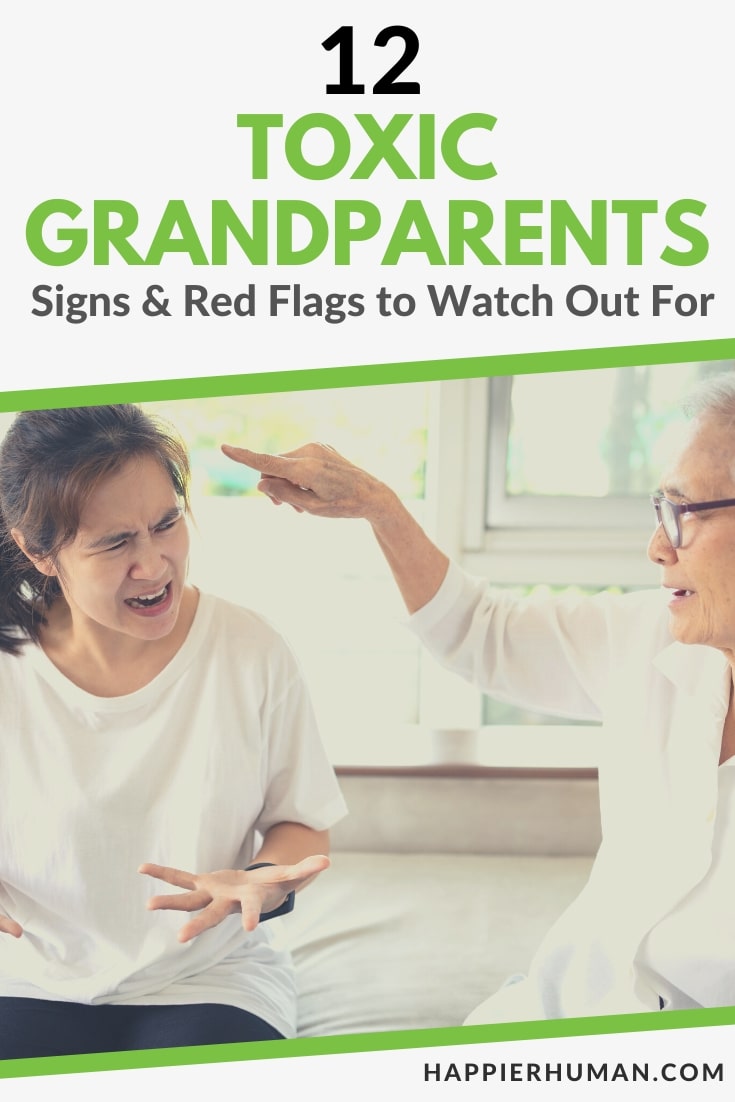Toxic grandparents? How did we get here? And what are the red flags one has infiltrated your life? The last time I checked, grandparents were the “sweet” ones.
They used to come by and spoil the grandchildren rotten but in a good way.
Grandmas helped around the home, so daughters could relax and unwind from exhausting mommy duties. Granddads usually go missing when they visit. If they’re not out in the shed fidgeting with tools, they’re tinkering with the old car in the garage.
Somehow, somewhere along the way, grandparents have evolved. Some can be difficult to deal with and certainly unhealthy for you and your kids to be around.
You may be tempted to cut them off to protect your and your children’s well-being. While it may be a remedy, it can also be a bit too drastic, for now.
First, take a few minutes to explore everything you need to know about toxic grandparents who get on your last nerve or undermine your parenting.
Getting a comprehensive understanding of the signs and red flags is key to handling the situation with confidence. Let’s begin by exploring toxic grandparent behaviors, how they impact your life, and how to respond.
The end goal is to get the situation under control and restore order when they come around. Ultimately, you want to protect your and your family’s well-being, even if it comes down to cutting them off.
What Is a Toxic Person?
A toxic person is someone who has a pattern of negative behavior that is distressing and disruptive to your life. In terms of an actual definition, Psychcentral describes a toxic person as “…someone who is subtly or outwardly manipulative, self-centered, needy, or controlling. Their behavior is typically unpleasant or malicious toward others.”
Dr. Lilian Glass is known for making the term “toxic person” famous through her book, Toxic People: 10 Ways of Dealing with People Who Make Your Life Miserable. She describes their behaviors in great detail in the book.
What Causes Someone to Become Toxic?
Toxic personality traits are commonly seen in those affected by personality disorders such as borderline, bipolar, and narcissistic personality disorders.
Similarly, someone with intermittent explosive disorder (EDD). These individuals are wired to cause chaos, drama, and conflict. This is how they function.
Despite their age, grandparents can possess these maladaptive personality traits. It’s not a normal day unless they fly off the handle in the case of a borderline grandparent. Oh, the yelling and screaming for minor matters.
The behavior is often disproportionate to the current situation. Imagine how this affects your ability to interact with them and how it can frighten your children.
With narcissistic grandparents, toxic behavior involves manipulating situations to get their needs met. Narcissists are also more prone to gaslighting, profuse lying, and exploiting vulnerable people, such as their kids, to get their way.
While the behaviors should not be excused, it helps to know why toxic personalities behave the way they do. They really can’t help how they interact or react. The traits are usually embedded due to negative childhood experiences or low self-esteem.
Their actions and reactions are also an expression of trying to cope with their own trauma and personal challenges.
Many times they upset the lives of others, unaware of the effects on the relationship. Working with a mental health professional, building awareness, and using mindfulness can lead to positive changes in their behavior.
The Dangers of Toxic Grandparents in Your Life
The problem with a grandparent like this is they pose a constant threat to your well-being, whether emotionally, psychologically, or even physically.
There’s also the potential for their actions to rub off on your kids.
With a toxic individual, you’re always on edge around them. They have a way of bringing out the worst in you or leaving you feeling overwhelmed, frustrated, confused, angry, anxious, stressed, or guilty.

Other times, you feel like you have to tip-toe around them to avoid conflict.
Your self-esteem may decline as time goes by. You may lose trust and respect for them or withdraw from contact to cope. Researchers found dealing with toxic people may cause the other party to use or abuse addictive substances to cope.
Overall, their traits will likely strain your relationship.
The degree to which the situation affects you will depend on the level of interaction with the toxic grandparent. For example, if you live in the same home, your exposure level is likely to be higher compared to if you lived apart.
Should I Cut Toxic Grandparents Off?
I have a thing for older adults and seniors. I get along well with them. They would have to really get on my bad side for me to disconnect.
Cutting off the high-conflict individual or going “no contact” can be a solution. Note that it is a bit drastic but sometimes the only viable solution.
You’re the best person to assess the situation and decide what’s best for you and your children. Perhaps you can start by pointing out the behavior. If that doesn’t work, developing and maintaining stronger boundaries can provide some relief.
Reassess their progress and take it from there.
If it gets down to self-preservation and protecting your family members from their unhealthy ways, then by all means. Your peace of mind should always take priority over maintaining relationships with toxic people.
12 Toxic Grandparents Signs & Red Flags to Know
Toxic relationships can involve not just your grandparents but also your parents, whose conduct is unhealthy for your kids. Many of the indicators are subtle, making it harder to recognize you’re dealing with a toxic person.
Overlooking certain behaviors as being “just their personality” because it’s your relative is another reason we miss the signs.
Below are some of the toxic traits, behaviors, attitudes, and attributes noticed in grandparents. Once you get through all 12 signs, you’ll be better prepared to manage their interaction with you and your family.
1. They undermine your parental authority
Grandparents sometimes forget their adult children can take care of their own lives and their family without interference. They’ll poke their nose into everything, including how you’re raising your kids.
You’re happy they stop by to check on you or play with the grandchildren. But oh, my! They test your patience by allowing the kids to do things against the rules of your home.
They’ll brush it off as nothing when you bring it to their attention. For example, by saying, “Come on, let the kids have fun.”
The bold ones may accuse you of attempting to undermine their relationship with the grands.
2. They change your parenting rules
Things are bad enough with them ignoring your authority and allowing your children to get away with things you won’t let them. Now, your parents are changing the rules you’ve set out. They don’t even consult you or anything.
Their action suggests a lack of respect for you as an adult who’s capable of deciding what’s best for your kids. I can imagine how upsetting this is for you.
Confronting them won’t make them change. Instead of acknowledging overstepping their boundaries, they may double down by questioning those rules.
3. They question your parenting skills
Nothing irks a parent more than when anyone questions their parenting skills. To me, it’s like attempting to put me down in a sneaky way.
Everyone parents differently. However, your parents can get jealous if they notice you have a healthier dynamic going with your children.
Grandparents who belittle your parenting skills are sometimes those who are dysfunctional parents.
As you may know, the cat loves to call the kettle black. Moreover, questioning your parenting skills in the presence of your kids is taking their drama to a new level.
4. They spoil the kids to one-up you
Grandparents traditionally are more lenient with their grandkids, and sometimes there is nothing sinister behind it.
The motive is different for a toxic grandparent. They intentionally give the grandkids whatever they want to become their favorite parental figure.

More specifically, they will try to one-up by lavishing the kids with materialistic things, including money. They will pick out items you may not buy for the kids or think they need. For example, expensive clothing or electronic devices.
One-upping is a divisive strategy commonly used by narcissistic parents. It takes the same form if it’s a grandparent who’s doing this to make you look bad.
5. They bypass you and speak directly to the grandkids
The grandparent in question may bypass you for different reasons but largely to avoid dealing with you. For example, calling on the phone and requesting to speak with your kids without acknowledging you.
I’ve seen instances where the toxic grandparents visit to see the grandkids and don’t say a word to you.
They act as if they’re entitled to spend time with them. Usually, this happens when the relationship is strained between you two. However, it’s your children and your home. It’s time to call them out on the disrespect.
Let them know they can visit so long as they can be cordial and respectful.
6. They communicate with you through your kids
When they’re not skipping over you to get to the kids, they try this other strategy.
You’ll recognize the pattern when you receive messages through your kids. “Grandpa says to tell you he wants to take us to the water park next weekend.” Or “Grandma says to tell you you need to let her spend the weekend with us.”
Adopting this form of communication is a sign of a lack of emotional maturity.
This might have been acceptable back in the days when phones were not a thing or the older generation didn’t know how to use technology.
Today, grandparents can be more tech-savvy than the younger generations. Even back in the day, a respectful grandparent would write you a letter, not use the kids as proxies.
7. They engage in emotional blackmail
Emotional blackmail is a weapon used by toxic, manipulative people to keep you under their thumb. Usually, they know something about you that you prefer they won’t disclose.
A manipulative grandparent may leverage your secrets to get their way by threatening to expose you to the grandkids.
Emotional blackmail can also take the form of giving you ultimatums or setting conditions to make you comply with their demands. For example, saying, “I will stop giving you financial support unless you do this for me?”
Another example is, “You better keep sending me money, or you’ll have to find someone else to babysit.”
Emotional blackmail is emotional abuse and can impact your mental and emotional health. Be sure to call them out as soon as you notice it’s happening. Otherwise, they will become more powerful, demanding, and controlling.
8. They bad mouth you behind your back
Some grandparents will go to lengths to make your children feel they were born to the wrong parents. Here’s a classic example statement. “Your mother is no good. I don’t know why my son chose her. She barely takes care of you guys. Can’t you see?”
Badmouthing you to your kids is a low blow. Loving, mature, and respectful grandparents wouldn’t want their grandchildren to think ill of you, whether you are their daughter or daughter-in-law.
A mature person does not stoop that low and try to manipulate children to dislike their parents. In some cases, they extend the criticisms and belittling to your kids’ father, or they bad mouth you to your spouse.
9. They badmouth the other grandparents
Make no mistakes, grandparents can be just as divisive as any other toxic individual. If the toxic grandparent in this case isn’t your parent, they may speak unkindly of your parents to your kids.
For example, they may unfairly compare themselves or criticize your parents. Another example is telling you they hardly spend time with their grandkids.
They may also triangulate your parents to the grandkids. Triangulation is commonly practiced by narcissists and those with borderline personality disorder.
The manipulative tactic is used for different reasons, including pitting people against each other. For example, they may ask your kids “Do you know why you rarely see your other grandparents? They don’t care about you.”
10. They play favorites with the grandkids
Like many parents, grandparents also have favorite grandchildren. In the case of those who are toxic, they don’t hide the fact that they prefer one grandchild over the other.
They demonstrate how they feel by giving more attention, affection, and gifts to one child than the other.
Some may expressly tell one grandkid “You’re my favorite” in front of the others. Doing this can cause emotional harm to your child. The sidelined child may feel rejected and unworthy of love and attention.
11. They stage a grandparent takeover
In extreme cases, they may stage a grandparent takeover in the form of trying to take your kids from you. There are cases where they make false claims of parental neglect or abuse to get custody.
Oh, the audacity some of them have. Haven’t they done enough? They already break your rules, question your parenting abilities, and degrade the kids’ father along with your parents.

Now they are trying to dispossess you of your children through the court system? No way!
Whether they have good intentions or not, this is not acceptable behavior. It’s time to draw the line, even if it means cutting ties or keeping them away from the grandkids.
12. They break your boundaries
Some elderly adults are stubborn to the nth degree. No matter how much you tell them not to do a particular thing that upsets you, they’ll do it. Maybe it’s short-term memory loss, which is common among aging adults. In that case, you can offer compassion.
Outside of that, hold them accountable for doing things that go against your wishes. Be mindful about where and when you check them on their behavior.
They may cause a scene to play the victim if the children are around. After holding them accountable, create firmer boundaries.
Next, let them know you plan to follow up with consequences if they push beyond your limits.
Toxic Grandparents Effects on Grandchildren
A toxic grandparent’s negative attitude can spill over to the grandchildren. This usually happens if they openly disregard your rules and decisions in front of the kids. Similarly, if they speak negatively about you or your spouse to the kids.
The younger the grandkids, the easier it is for them to believe their grandparent’s lies and pick sides. They may not have the level of intelligence or self-awareness yet to know this is wrong.
Negative behaviors to create division can also make them feel confused or cause them to dislike you.
Recommended read: 10 Types of Toxic People to Avoid at All Costs.
Final Thoughts on Toxic Grandparents
A rule of thumb for finding out if someone is toxic is to measure their behavior and decide if the bad outweighs the good.
Know having a toxic grandparent in your life isn’t your fault. What matters is equipping yourself now with the knowledge of what to look for. This helps you to respond appropriately and get the situation with the grandparent in question under control.
Limit your time around them if they always leave you feeling emotionally drained and upset. Other solutions include discussing their behavior, asking them to change, and avoiding getting sucked into the drama.
Establishing firm health boundaries is a tried and proven way to protect your well-being.
If the remedial steps fail, cutting them out of your life may be the next step. As a part of self-care, you can consider speaking to a trusted person or a therapist.
A therapist can help you make sense of the experience and provide healthy coping tools. Here’s another article to increase your awareness of toxic relatives. Is My Mom Toxic? 15 Signs of a Toxic Mother.
And if you want more articles about family, be sure to check out these blog posts:
- 19 Not-So Subtle Signs Your Mother Hates You
- Why Do I Attract Toxic People? 7 REAL Reasons Why
- 11 Toxic Person Tests to See if You're Hurting Others
- Family Scapegoat: Definition, Signs, and How to Cope
- 11 Signs of Bad Parenting That Negatively Impact Your Kids


